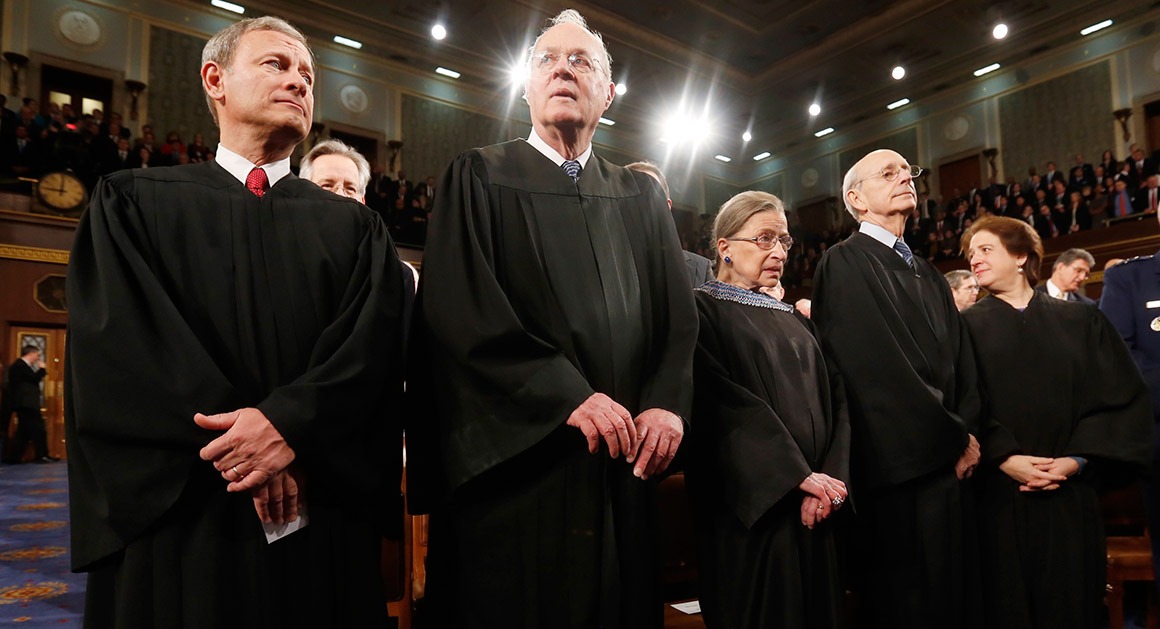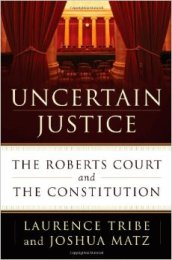The growing body of literature about the Roberts Court can be sorted into three categories. Some, like Jan Crawford’s Supreme Conflict and Jeffrey Toobin’s compulsively readable The Nine, combine analysis of the Court’s major decisions with journalistic scoops about its inner workings. Others, like Mark Tushnet’s In the Balance, assess its jurisprudence through the lens of sophisticated legal theory. And books like Marcia Coyle’s The Roberts Court: The Struggle for the Constitution are primarily descriptive histories of the Court’s major decisions. Laurence Tribe and Joshua Martz’s Uncertain Justice: The Roberts Court and the Constitution falls into the latter categories. It’s an unfailingly intelligent book with strong insights, although at times it’s unclear what the audience for the book is intended to be.
There’s another kind of book Uncertain Justice is not—a debunking. With an increasingly conservative Republican Party having controlled the Supreme Court for four decades now, some liberals (as seen in the late James MacGregor Burns’s Packing the Court and Ian Millhiser’s forthcoming Injustices) are restoring traditional progressive critiques of judicial power that went into abeyance during the years of the Warren Court (1953-1969). Not surprisingly—Tribe, after all, is not only perhaps the country’s most influential constitutional scholar but an advocate with three dozen Supreme Court oral arguments under his belt—Uncertain Justice is not that kind of book. Certainly, the authors are sometimes critical of Roberts Court decisions. But the Court is treated with general reverence. Tribe and Martz try hard to put the justices in the best light. Justice Kennedy is “[e]nergetic, friendly, engaging … a true humanist.” Justice Scalia “has used his wit, erudition and rhetorical talents to leave an indelible mark on our jurisprudence.” Justice Sotomayor’s memoir is described as “captivating” and Justice Thomas’s as “gripping.” And so on. Some of this can be a bit much, but the evenhanded tone has its strengths.
Strengths are less evident in the first two chapters. Not surprisingly, Tribe and Martz start with equal-protection law (anchored around recent decisions striking down Section 4 of the Voting Rights Act and Section 3 of the Defense of Marriage Act) and proceed to the constitutional challenge to the Affordable Care Act. For casual Court-followers, this analysis will be reliable and provide useful detail. For those who follow the Court closely—a group I would guess is more likely to pick up the book—these chapters will have little that is objectionable, but also little that will cause anyone to rethink their views of the cases. Tribe and Matz don’t really have a new angle on these widely-discussed cases.
Several subsequent chapters, however, have much more potential interest for knowledgeable readers. The strongest is an extensive analysis of the Roberts Court’s free speech doctrine. Tribe and Martz convincingly demonstrate that the perception that the Court’s conservatives have consistently embraced a robust conception of free speech rights is, at best, misleading. The affluent, it is true, can count on almost any restriction on the use of their money to be struck down (even in cases where the regulations in question do not directly suppress any speech). Other groups, though—including prisoners, students, public employees—have not fared as well. Tribe and Matz offer a particularly compelling critique of Holder v. HLP, which upheld a broad interpretation of a statute criminalizing even lawful political activity that provided “material support” for designated terrorist groups, even in the absence of empirical evidence of said support. While the Roberts Court’s Republican majority has sometimes upheld the free speech claims of relatively unpopular speakers, Tribe and Matz make a good case that “the Roberts Court is not as libertarian as it sometimes seems” on free speech issues.
This argument is intriguing, but also unconvincing. There is a very big difference between coercing individuals—who have explicit free speech rights—and coercing states, who do not.
Their most original argument concerns the Court’s deciding to rewrite the Affordable Care Act to make its extensive Medicaid expansion optional (rather than making all Medicaid funds contingent on accepting the changes). Seven justices, including Democratic nominees Stephen Breyer and Elena Kagan, voted for this unprecedented limit on the federal spending power. Some observers (including myself) have interpreted Breyer’s and Kagan’s votes as strategic, doubting that either would have been the swing vote to limit the expansion but wanted to ensure that Roberts would not vote to strike it down. Tribe and Matz not only reject this but try to make a liberal case for the Medicaid holding. Their argument ties the Medicaid decision to a line of cases dealing with the use of the spending power to limit certain forms of speech. The Court’s doctrine in this area has been erratic, striking down a provision that required groups seeking AIDS funding to explicitly oppose prostitution and sex trafficking, but upholding (for example) provisions making educational funding contingent on giving military recruiters access to campus and preventing recipients of certain federal funding from providing abortion counseling. Tribe and Matz advocate for more of the former and less of the latter, and see the Medicaid decision as being part of a tradition of limiting the use of the federal power to coerce.
This argument is intriguing, but also unconvincing. There is a very big difference between coercing individuals—who have explicit free speech rights—and coercing states, who do not. Despite these valiant efforts, the defense of the Medicaid expansion collapses on itself—it would be clearly constitutional for Congress to have simply created the 2013 version of Medicaid from scratch, and it would also be constitutional for Congress to repeal the program entirely, so it makes little sense to say that it’s unconstitutional for Congress to make existing Medicaid funding contingent on accepting new and more generously funded conditions.
For the general reader, however, an original argument that fails to convince is often more interesting than an unoriginal one that does, particularly when it draws attention to an under-discussed group of cases. Despite some dull patches, there is enough interesting analysis in Uncertain Justice to make it a useful contribution to the literature on the Roberts Court.
Scott Lemieux is a professor of political science at the College of Saint Rose. He is a frequent contributor to The Guardian and The American Prospect, and he blogs for Lawyers, Guns and Money.







0 Comments
Trackbacks/Pingbacks